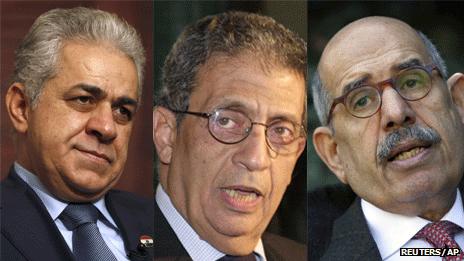Egypt opposition leaders face 'incitement' probe
- Published

Egypt's public prosecutor has ordered an inquiry into three prominent opposition leaders.
The men will be investigated over charges they "incited the overthrow" of President Mohammed Morsi.
The three men - Mohamed ElBaradei, Amr Mousa and Hamdeen Sabahi - formed an opposition coalition amid protests against Mr Morsi last month.
There are fears the inquiry may worsen tensions between Mr Morsi's supporters and his opponents.
The three opposition leaders had recently formed a coalition, the National Salvation Front, to take part in protests against Mr Morsi.
Some of those rallies then turned violent when opposition protesters and Mr Morsi's Islamist supporters clashed.
Mr Mousa and Mr Sabahi were both candidates in the presidential election won by Mr Morsi in June.
Also on Thursday, parliamentary affairs minister Mohammed Mahsoub resigned from his post, saying that many of the government's policies "contradict my personal beliefs".
Mr Mahsoub, of the moderate Islamist Wasat party, is the second minister to resign this week.
Sensitive time
The public prosecutor Talaat Ibrahim was appointed by Mr Morsi last month, after his predecessor was sacked.
The move angered senior judges, who saw it as an attack on their authority.
The investigation does not mean that charges will be filed against the opposition leaders, but it comes at a sensitive time, the BBC's Bethany Bell in Cairo reports.
President Morsi temporarily gave himself sweeping new powers last month, and pushed ahead a referendum on a controversial new constitution, sparking a political crisis.
Many judges boycotted supervision of the referendum on the new constitution. Some 63% of voters backed the new charter, although only a third of the electorate voted.
Opponents of the constitution say it is too heavily Islamist in character and that it does not safeguard the rights of women and minorities.
Fresh parliamentary elections are now due to be held within two months.